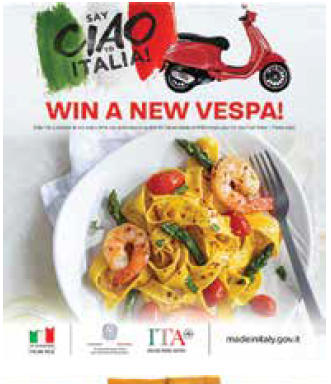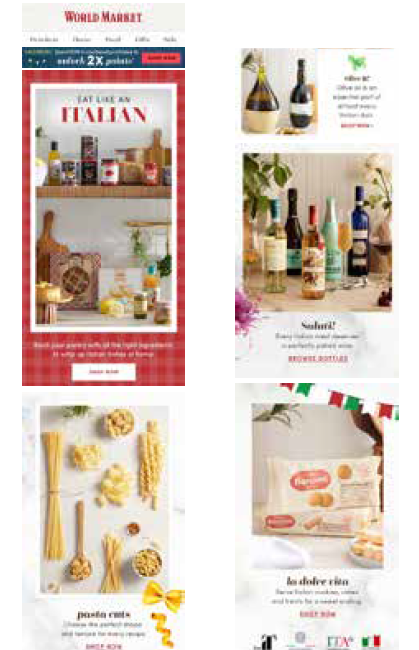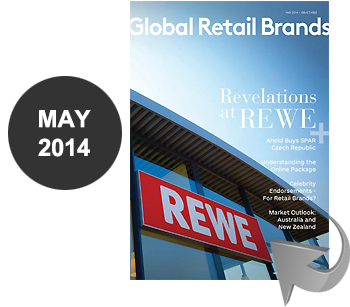Everyone loves a good story. And the deeper the story’s roots, the richer its characters, and the more beautiful the setting, the better.
Everyone loves a good story. And the deeper the story’s roots, the richer its characters, and the more beautiful the setting, the better. You have to care, to be compelled, and to be taken away from the daily grind to invest your time in a story. Retailers know that consumers want to believe in the products they buy. They want to trust them. And in some cases, they want their products to elevate them. If retailers can connect with their customers on this visceral level, they have a loyal customer.
But is there such a story for retail to embrace?
One with Intrigue. Drama. Beauty.
Lights…Camera…Action.
Starring…
Pizza, Pasta, Cheese, Wine, Tomatoes,
Olive Oil, Balsamico
The Story: Italian Cooking is the official candidacy of the Italian government as a UNESCO Intangible Cultural Heritage Element. This narrative is years in the making, centering on intricate history, threaded with the melding of various cultures to create a lifestyle focused on leisurely enjoying fresh, local foods that tantalize the taste buds.
The Setting: Dramatic cliffs overlooking azure waters, hilltop towns flanked by centuries old castles, pastel-colored vespas zipping through glittering streets dotted with Roman ruins and modern buildings, and green rolling hills sprinkled with olive groves and vineyards.
The Characters: The Italian Trade Agency, a government agency dedicated to the growth of Italian products worldwide; Italian Cuisine, a food loved by Italians, Americans and an increasing percentage of people around the world.
The Italian Trade Agency as The Protagonist:
The Italian Trade Agency plays an important role in supporting the growth and popularity of Italian products. The agency is dedicated to fostering the international business growth of Italian companies and attracting foreign investment into Italy. ITA is a government agency that has a dynamic and contemporary structure, along with a comprehensive network of offices worldwide. ITA offers information, support, consulting, promotion, and training specifically for small and medium-sized Italian businesses. Utilizing modern multi-channel marketing and communication strategies, it promotes the quality of Made in Italy on a global scale. The agency operates 79 offices across 65 countries, serving as a key resource for businesses looking to connect with Italian partners, whether for sourcing products or exploring investment opportunities in Italy.
The ITA has five offices across the United States— located in Chicago, New York, Los Angeles, Miami, and Houston—each targeting different industry sectors. The Chicago office specifically concentrates on marketing and promotional efforts aimed at collaborating with major U.S. supermarket chains to create and coordinate authentic Italian-themed promotions, both in-store and online. Additionally, ITA Chicago promotes private label products and organizes official Italian pavilions, featuring food and non-food items, at the annual PLMA trade exhibition in Chicago. As PLMA is the largest private label trade show for the North American market, the show holds significance and opens the door to wider access to the US Retailer Market. At the PLMA 2024 addition, ITA plans to bring nearly 80 companies, illustrating the results of much effort on behalf of the ITA to continue growing Italian business interest in the US.
2024 ITA’s Retail Engagements: In Store and Digital Authentic Italian promotions
In 2023-2024, ITA Chicago partnered with the following U.S. Supermarket retailers: HEB, Hy-Vee, Rouses, Schnuck Markets and World Market in providing the co-promotional funding to these retailers to utilize in their Authentic Italian themed promotions, both in-store and online.

HEB Retail Media partnered with the Italian Trade Agency (Chicago office) in a 12 month “Ciao Italia” digital and e-commerce campaign to showcase their large selection of authentic Italian food and beverages emphasizing culinary excellence and traditions across key food and beverages departments.
The campaign’s rapid growth metrics and introduction of over 450 “new” Italian SKU’s reflected H-E-B’s continued dedication to promoting to their customer base their selection of authentic Italian F&B.
This collaboration with the ITA continues to solidify H-E-B’s reputation as a key destination for Authentic Italian in the U.S. market.

Employee-owned Des Moines, Iowa based Hy-Vee is another excellent example of the value and importance of their partnership with the Italian Trade Agency.
Hy-Vee’s development of their successful Product of Italy “Best in Class” private label line “Gustare Vita” features a wide selection of over 130 SKUs in multiple categories ranging from pasta, extra virgin olive oil, sauces, cookies, balsamic vinegars, and more.
Hy-Vee’s Italian private label brand has seen their sales of Authentic Italian F&B, since the start of their collaboration in 2017, increase by over 84.5%. Hy-Vee’s annual Spring and Fall “Say Ciao to Italia” promotion is a big hit with their customer base. Point of Sale window banners, recipe cards, wine cards, digital marketing and social media marketing have been critical elements of their success.

Based on the rapid growth of Authentic Italian food in the U.S. over the past 5 years (+29%), and on the food culture global awareness of a large segment of the US population who identify themselves as “adventurous eater”, World Market expressed their interest in partnering with the Italian Trade Agency (Chicago office) in exploring this burgeoning segment by expanding their outreach to consumers of “Authentic Italian: food and beverages.
World Market represents the first “non-traditional” food retailer that began selling furniture from around the world in the 1950s in San Francisco and has since expanded their selection of products to include artisan goods from around the world, and international food favorites. WM is not a full grocery store; thus, it provides a different shopping experience for customers to discover authentic Italian food and wines.
In today’s market, alternative grocers, such as World Market, are an area for growth as more customers opt to do their main grocery shopping there when it comes to specialty foods and bringing the Italian Mediterranean cuisine to customers in their 242 stores across 37 states in the U.S.

Louisiana-owned Rouses Markets is one of the Gulf Coast’s top private companies and largest employers. Founded in 1960 by Italian immigrant J.P. Rouse with a single store in Houma, it is now led by third-generation CEO Donny Rouse. Today, 66 stores and 7,000 team members serve customers across Louisiana, Mississippi, and Alabama.
Rouses Markets actively supports local food banks, charities, festivals, and events throughout the Gulf Coast. It has been voted Best Supermarket on the Gulf Coast, recognized as a Top Workplace, and is the official Supermarket of the New Orleans Saints. The company also celebrates its Italian heritage with authentic Italian promotions and a line of private label products.
Starting in 2017, Rouses Markets established a partnership with the Italian Trade Agency (Chicago office) growing their selection of Authentic Italian food and beverages.

The St. Louis-based retailer kicked off their special 2024 Italian themed promotion in September in selected locations in Missouri, Illinois, Indiana, and Wisconsin by showcasing their extensive selection of authentic Italian food and beverages. The Midwest of the United States has become a food-loving region in the heart of the United States that is rivaling with the East and the West coast as a destination for culinary experience and a selection of specialty international products.
In addition to special incentives in the purchase of Made in Italy F&B, Schnucks’ Italian themed promotion included several in-store cooking demonstrations and sampling. “The Taste of Italy” event is Schnucks’ way of bringing customers delicious new Italian foods they may have experience while traveling in Italy. A second Italian themed promotion at Schnucks is planned for February 2025.
Americans Love Italian Food:
This story could not be told without detailing Americans’ fondness for Italian food. Italian food is a timeless, romantic cuisine, with a rich history of using fresh, quality ingredients, which appeals to consumers. While there are many Italians living in the U.S. and even more Italian Americans – according to Statista, as of January 2021, there were approximately 2.3 million Italians living in the U.S and according to the National Italian American Foundation, about 17-26 million Americans identify as Italian American – the desire for Italian cuisine stretches across the country. Supporting this notion, Datassential, a leading global food and beverage intelligence platform in its 10th annual list of food and flavor trend predictions for 2024, found that 85% of consumers love or like Italian food. Additionally, according to Ibisworld data, the Italian restaurant industry climbed to an annualized growth rate of 3.5% over the five years to 2024. It’s predicted that in 2024, the industry will see a revenue growth of 1.7%, reaching $94.8 billion. Americans’ love affair with Italian cuisine continues to blossom.
From restaurants, to supermarkets, to specialized retailers, shoppers in the U.S. can find a plethora of Italian food options including private label and exclusive brands. Italian food trends have expanded in the past few years and are providing retailers and suppliers with opportunities to grow their businesses with innovative Italian product offerings. While pizza and pasta lead the way in terms of popular Italian foods, new trends and expanding consumer palates provide ample opportunity for competition. Most recently, trends include Italian cuisine fusing with other global cuisines, niche Italian products, regional Italian, premium products and the terroir of olive oil, to name a few.
Retailers in the U.S. such as Kroger, South Eastern Grocers (SEG), Albertsons’ and Target are featuring private labels that adhere to these current trends. For example, Target’s Good & Gather Signature line offers consumers on-trend premium Italian products such as Good & Gather Signature Tomato, Garlic and Calabrian Chile Spread, Good & Gather Signature Wood-Fired Uncured Pepperoni with Spicy Honey Drizzle Frozen Pizza and vegetarian-geared Good & Gather Frozen Thin Crust Supreme Pizza with Plant- Based Sausage, and Good & Gather Burrata Lemon Zest Herb Ravioli.
SEG recently rolled out an on-trend line of clean label products called Know & Love, free of 100 ingredients, such as certified color additives, partially hydrogenated oils, high fructose corn syrup and sweeteners such as aspartame, saccharin and sucralose. A couple of Italian items included in this line are an organic spaghetti and a gluten free spaghetti.
Kroger jumps into the Italian cuisine trend as well, and offers many premium options of popular Italian foods under its Private Selection brand. Shoppers can find items including Private Selection Tomato & Black Truffle Pasta Sauce, Private Selection Porcini Arrabbiata Pasta Sauce, a variety of Private Selection dried pastas in shapes ranging from Bucatini to Trottole and Private Selection Italian Buffalo Mozzarella & Arugula Thin Crust Frozen Pizza, just to name a few options. Furthering the retailer’s push to highlight Italian cuisine is the announcement on Kroger’s website that indicates that the retailer is “Your Ultimate Destination for Authentic Italian”, indicating support from the Italian Trade Agency and the Ministry of Foreign Affairs and International Cooperation.
In the past year, Albertsons’ and Safeway introduced new pizzas under their Signature Reserve premium line. The new pizzas were touted as being made with a 24-hour pizza dough leavening technique that involves baking the pizzas on a lava stone from Sicily’s Mt. Etna. Additionally, the new pizzas offer “restaurant quality” toppings and a few options boast that they are made without high fructose corn syrup and are non-gmo.
Retailers continue to cater to consumers who crave Italian cuisine and will surely proceed to rollout new products to satisfy this desire. Let’s take a peek into the Italian food trends for 2024 that may influence the introduction of new products:
Italian Fusion:
Italian cuisine is a worldwide favorite for many reasons, including its ability to adapt to different flavor palates. Recently chefs and retailers alike are experimenting with blending traditional Italian staples with foods from across the globe. A few trending combinations include: the merging of Italian and Japanese cuisines, known as Wafu; melding the flavors of bulgogi, a Korean specialty featuring marinated and grilled meat, with Italian specialties like truffles and buffalo mozzarella; and experimenting with pizza toppings from Mexican flavors such as beans and spicy chorizo.
Niche Italian:
Restaurants and manufacturers are also adapting popular Italian foods to cater to specific diets such as gluten free, vegan and organic. Restaurants and retailers are producing gluten free pizzas and pastas, and vegan varieties of dishes, enabling more consumers to enjoy Italian delicacies without breaking from their diet needs.
Sustainable Italian:
Concern for the environment continues to be front and center for many consumers. While in Italy, there has always been a focus on local and fresh ingredients, this concern has expanded across the globe. Shoppers and customers are gravitating towards importing Italian products that are locally sourced, organic, and whose companies embrace ethical food practices.
Premium Italian:
As consumers continue to favor Italian products, many retailers in the United States are introducing premium lines to provide shoppers with upscale varieties. For instance, consumers may see pastas in a variety of shapes, and pizzas that are crafted with distinct baking methods and with artisanal toppings.
Terroir Italian:
In recent years, there has been a focus on the terroir of extra virgin olive oil, highlighting the distinct attributes of olive oil from specific regions of Italy. The term terroir is commonly employed in the wine industry and has crossed over to olive oils to allow consumers to appreciate the nuances in olive oil varietals and the unique qualities of each region.
The UNESCO Crescendo:
The romance and love affair continues, and the climax of this story culminates with the announcement of the prestigious nomination of Italian Cooking to become a UNESCO Intangible Cultural Heritage Element. The Italian Ministry of Culture and the Italian Ministry of Agriculture announced this in March 2023, emphasizing the importance of Italian Cooking’s sustainability, biodiversity, culture and traditions.
The road to nomination began a few years ago and included support from a variety of players who are knowledgeable and passionate about Italian food and culture, including the Editor-in-Chief of the publication La Cucina Italiana, Maddalena Fossati. Fossati, alongside world-renowned chefs such as Massimo Bottura, Davide Oldani, Antonia Klugmann (just to name a few) and entrepreneurs, highlighted the global significance of Italy’s culinary culture and championed the nomination.
This initiative seeks to advance the recognition of Italian cooking as a UNESCO Intangible Cultural Heritage Element. This is not the first time Italian culture has been honored by UNESCO, with nominations in past years for the Mediterranean Diet and for Neapolitan Pizza makers. The current nomination is significant because it brings the entirety of Italian food and culture to the forefront.
According to Fossati, as reported in La Cucina Italiana, “I am deeply moved by this news as I have arduously campaigned for this outcome because I believe in our identity, and in this complicated yet wonderful country that is Italy. Now’s the time to try and determinedly reaffirm the importance of our culinary lifestyle, which is loved and imitated all over the planet.”
This nomination illuminates the deep connection between Italian culture and its food. Italian cuisine is influenced by various cultures that have inhabited the country, including the Etruscans, Greeks, and Arabs. While Italy is recognized in the United States for its high-quality pasta, pizza, olive oil, and wine, its culinary landscape is defined by distinct regions, each with its own specialties. For instance, Lombardy is known for rice and polenta; Lazio, which includes Rome, is famous for pasta dishes like bucatini all’amatriciana, carbonara, and cacio e pepe; Tuscany offers favorites such as panzanella and steak alla Fiorentina; Campania is celebrated for its fresh produce—like eggplants, tomatoes, peppers, greens, lemons, and figs—and Naples is home to the world’s first pizzeria. Sicily, with its fertile volcanic soil, produces olives, oranges, lemons, and almonds, as well as locally raised meats; Emilia Romagna, particularly Bologna, is known for Lasagne al Forno, and its cured meats like prosciutto di Parma, often paired with cheeses such as Parmigiano Reggiano.
Italian food and drink is entwined with daily life, which has led to the term: La Dolce Vita. Many Italians revolve their schedule around mid-day meals, and it is not only the food that takes center-stage, but the gathering of friends and family to partake in meals, sharing stories while savoring flavors. These traditions lend themselves to La Dolce Vita as Italians appreciate the experience of cooking, eating, and sharing with loved ones.
In due time, we will learn if Italian Cooking will earn official accolades. The dossier for nomination has been submitted, and the results will be revealed in December 2025. According to The European Food Agency, the dossier was written by the LUISS professor, Pier Luigi Petrillo, who in the past had also handled the nominations for UNESCO of the Mediterranean Diet and Neapolitan pizza makers.
The European Food Agency reported that the dossier for the UNESCO list of intangible cultural heritages states that Italian cooking is defined as “a set of social practices, rites and gestures based on the many local knowledge that, without hierarchies, identify and connote it.” Numerous publications, organizations, and citizens are eagerly anticipating the recognition of their cherished Italian cooking as a UNESCO Intangible Cultural Heritage Element. This prestigious designation will undoubtedly help keep Italian food in the spotlight for generations to come and perhaps we may see An Italian Love Story Part II in the near future.




























































